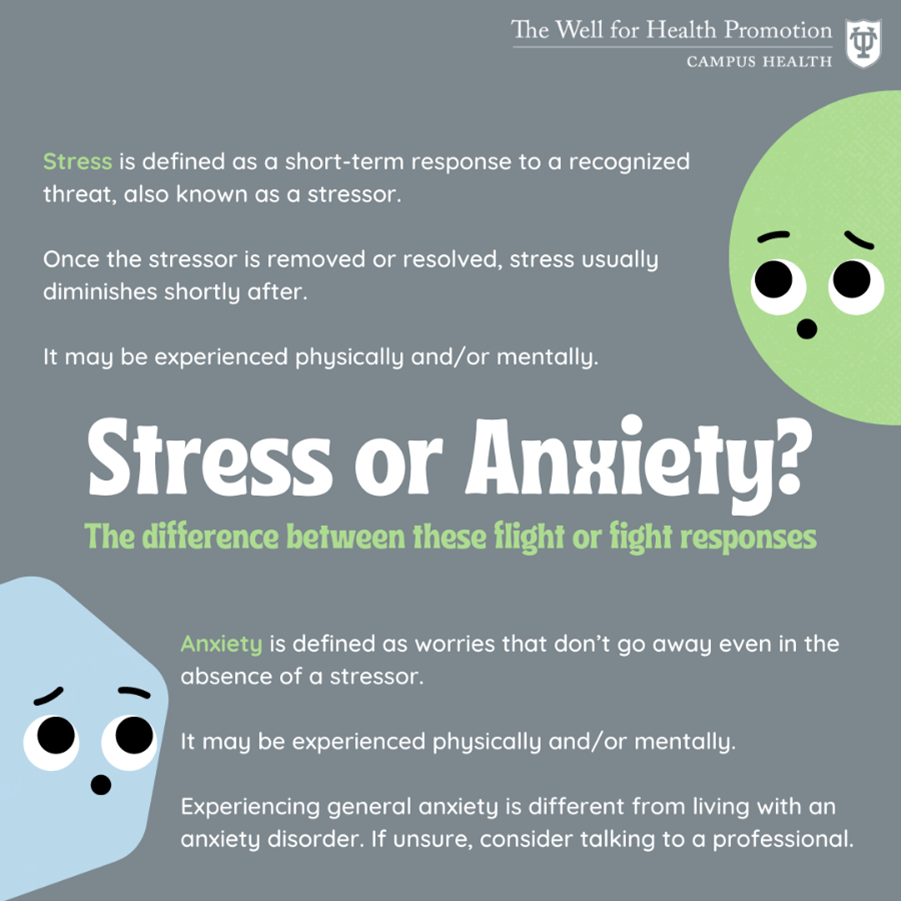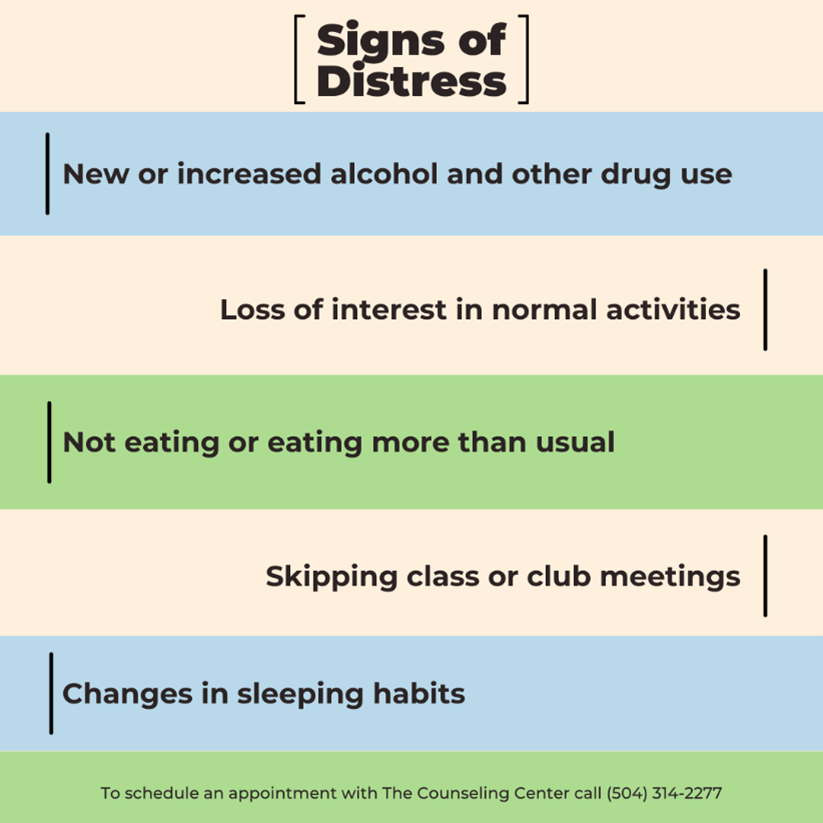College life comes with a variety of stressors, including challenging coursework, managing roommate relationships, social commitments, familial responsibilities among many others. With 42.5% of college students reporting that stress negatively impacts their academic performance, it’s important to learn what your stressors are and what techniques, tools, and resources can help.
Check out our eHealth Tools for a list of helpful apps with breathing techniques, mindfulness exercises, and stress management tools.

Stress and anxiety are DIFFERENT.
Stress is usually a short-term response to a situation, whereas anxiety is a long-term reaction to stress. So, in terms of anxiety, even once the cause (the stressor/stress) is removed, the effects of the anxiety may still be felt. Note that there is a difference between everyday anxiety that comes from these stresses and feeling the symptoms of an anxiety disorder. If you are unsure, consider consulting a professional.
There are two types of stress.
- External triggers are stressors from outside factors, such as getting a bad grade or a disagreement with a friend.
- Internal triggers are stressors that we place on ourselves, such as having high expectations or a fear of public speaking.
A healthy amount of stress can be good.
Certain stress, such as pressure to complete an assignment by the deadline, can help differentiate which tasks are urgent or time sensitive. This kind of stress can drive time management and motivation.
Excessive stress can negatively affect your emotional and physical health.
When stress becomes too much, it can limit your ability to function to your best ability. When managing stress on your own is not enough, consider seeking professional help.

Common signs of distress:
- Trouble completing assignments on time
- Headaches
- Skipping class
- Tight muscles
- Short temper or increased agitation
- Increased worrying
- Changes in sleeping habits
- Difficulty concentrating
- Changes in eating habits
- Unexpected changes in heart rate
Take a breath.
Taking deep, breaths from your belly can help substantially in supplying the body with oxygen, lowering blood pressure, and reducing stress and anxiety.
Try mindfulness techniques.
Mindfulness is a studied practice that can improve sleep, sharpen focus, and reduce stress and anxiety. The intentionality of being present in the moment and letting go without judgement helps with patience, self-awareness, and gratitude.
Learn your triggers.
Is it school, work, family, or social life? When these feelings come up, write them down in a journal or your phone and begin to look for patterns. Knowing what your main stressors are is the best way to identify solutions.
Moderate caffeinated beverages.
Immoderate amounts of caffeine are known to increase stress hormones and disrupt sleep. These drinks may make you more tense or nervous and increase your heart rate. Try drinking flavored water or non-caffeinated tea for a similar taste without the effects on your emotional and physical health.
Limit alcohol and other drug use.
Alcohol and other drugs are often used as relief from stress. However, they do not eliminate the cause of stress, so this relief is only temporary. Some drugs increase sensitivity to stressors while others mask the symptoms of stress, leaving them to be dealt with again later, sometimes making the stressors more intense than they were prior.
Exercise.
Any form of exercise, from walking to weightlifting, can help boost your mood, reduce your anxiety, and increase your energy levels. Try to find a routine that works for you, considering what you enjoy doing, how convenient the activity is, and who can join you to help with accountability.
Get some sleep.
Sleep is essential to maintain well-being and manage stress. Work on creating a consistent night routine to enjoy the benefits of adequate sleep. This can be as simple as journaling before bed or going to bed at the same time every night.
Be kind to yourself.
We often place high expectations on ourselves and get disappointed when we have a hard time reaching them. Try to be forgiving and patient with yourself and practice gratitude. Every day think about something you like about yourself or what you do well.
There are some things that are not within our control, but we can control how we react to stressors. Accept the situation as it is and think of what resources are available to you that can help mediate the problem.
Seek help when needed.
Whether it’s talking to a trusted friend, reaching out to a family member, or seeing a mental health provider, talking to someone and acknowledging that you need help is a step towards improving your mental well-being.
What to Do in a Mental Health Emergency
Counseling and Psychiatric Services (CAPS) Groups
Prioritize YOU: A Self-Care Workshop
National Suicide Prevention Lifeline: 1-800-273-TALK (8255)
Trevor Project LGBTQIA+ Lifeline: 1-866-488-7386
Trevor Project Text Line: Text START to 678678
Crisis Text Line: Text HOME to 741741
Check out our eHealth Tools for a list of helpful apps with breathing techniques, mindfulness exercises, and stress management tools.
